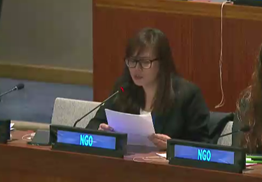Oral Statement Presented by WGNRR at the 61st Session of the Commission on the Status of Women (CSW) — March 13-24, 2016
This statement was presented by Sarah-Jane Biton on behalf of WGNRR on March 20, 2017. A recording of the statement delivery is available here with Sarah-Jane’s participation at 1:48:06.
Honourable Chairman,
On behalf of the Women’s Global Network for Reproductive Rights, I value the opportunity to represent over a thousand organizations and individuals worldwide, who are committed to advancing sexual and reproductive rights for all.
Realizing women’s economic empowerment, including their rights to and at work, is often rightly positioned as integral to sustainable development. Central to attaining women’s economic empowerment, is holistically ensuring women’s and girls’ human rights throughout the lifecycle. Yet when it comes to economic empowerment initiatives, sexual and reproductive health and rights are all too often at best, narrowly conceptualized, or at worst, completely disregarded.
We simply cannot talk about realizing women’s economic empowerment, without ensuring their abilities to: make informed decisions and exercise meaningful control over their own bodies; decide if, when, and how many children to have; and raise the children they do have in a healthy, safe and just way. All of these preconditions for economic empowerment require the provision of an enabling environment, not only through ensuring universal access to a range of voluntary contraceptives, but also access to: comprehensive sexuality education for all young people; safe and legal abortion services; and adequate parental leave and quality, affordable childcare; as well as the equitable distribution of care work.
As a young woman from Asia-Pacific, all too often I have seen among my peers the harmful ripple effects in my region of failing to ensure sexual and reproductive health and rights, circumscribing and rendering uneven any advances towards women’s economic empowerment. The denial of these rights limits women and girls’ ability to complete higher level education; perpetuates wrongful gender stereotypes; and amplifies the distorted distribution of unpaid care work among women and girls. In turn, this obstructs their ability to access skills and training; pursue full employment and decent work; and exercise full control over their resources and income, thereby exacerbating existing economic inequalities, and hindering both their own and their communities’ wellbeing.
In contrast, evidence-based research shows that when societies undertake meaningful steps towards fulfilling women and girls’ sexual and reproductive health and rights, they see an increase in: women’s ability to continue education; their productivity and earnings; and their autonomy and self-esteem; as well as an increase in gender equity, among other integral benefits.[1]
As noted by the Secretary-General, realizing women’s economic empowerment requires transformative, structural change.[2] As the evidence clearly shows, one key component of this change is recognizing that economic empowerment hinges on the fulfillment of sexual and reproductive rights throughout the lifecycle, including the universal provision of quality, comprehensive, and accessible sexual and reproductive health information, education, and services. It is therefore imperative, Mr. Chair, that at this session of the Commission on the Status of Women, we position sexual and reproductive health and rights for what they are: not as tangential but central to achieving women’s economic empowerment and wellbeing. Thank you.
[1] Guttmacher Institute and UNFPA (2014), Adding it Up: The Costs and Benefits of Investing in Sexual and Reproductive Health 2014, p. 34.
[2] Report of the Secretary General (2017), Women’s Economic Empowerment in the Changing World of Work, p. 2.

